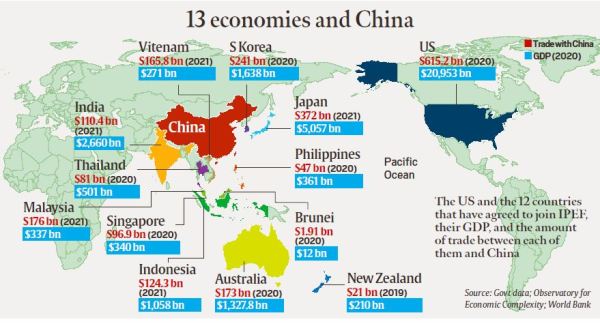Context
- The Indo-Pacific Economic Framework, launched by United States and being joined by 12 other countries including India, is Washington’s answer to the Trans Pacific Partnership (TTP) and its successor agreement, the Comprehensive and Progressive Agreement for TTP (CPTPP), as well as the Regional Comprehensive Economic Partnership (RCEP).

Photo Source: Govt data; Observatory for Economic Complexity; World Bank
Background
- The US had pulled out from the TTP due to enormous domestic backlash against the low/no tariff agreement in it — one of Donald Trump’s first decisions after becoming President.
- The US did not join the China-led 15-country RCEP. Last year, Beijing applied to join the 11-member CPTTP. So have Taiwan and the United Kingdom.
Why the framework
- The Biden Administration’s realisation that its near-onlooker status to the trade arrangements in the region, with China’s stamp all over it, did not match its Indo-Pacific strategic objectives spurred work on a new framework for doing trade. The aim was to reclaim economic leadership in East Asia and the ASEAN region without giving away concessions that would anger domestic lobbies.
- The challenges IPEF would address as “setting the rules of the road for the digital economy, ensuring secure and resilient supply chains, helping make the kinds of major investments necessary in clean energy infrastructure and the clean energy transition, to raising standards for transparency, fair taxation, and anti-corruption”.
- IMEF “marks an important turning point in restoring US economic leadership in the region and presenting Indo-Pacific countries an alternative to China’s approach to these critical issues”.
- US officials have emphasised that IMEF is not a free trade agreement, and not even any other kind of “same old, same old” trade agreement, but one that will offer flexibility. The negotiations will be along four main “pillars”.
Joining the IPEF
- India has announced it will join the bloc despite its concerns over certain aspects of the IPEF. The other 11 countries are Australia, Brunei, Indonesia, Japan, the Republic of Korea (South Korea), Malaysia, New Zealand, the Philippines, Singapore, Thailand, and Vietnam, which together account for 40% of the world’s GDP. Taiwan is not part of it.
The four pillars are:
- trade that will include digital economy and emerging technology, labour commitments, the environment, trade facilitation, transparency and good regulatory practices, and corporate accountability, standards on cross-border data flows and data localisations;
- supply chain resiliency to develop “a first-of-its-kind supply chain agreement” that would anticipate and prevent disruptions;
- clean energy and decarbonisation that will include agreements on “high-ambition commitments” such as renewable energy targets, carbon removal purchasing commitments, energy efficiency standards, and new measures to combat methane emissions; and
- tax and anti-corruption, with commitments to enact and enforce “effective tax, anti-money laundering, anti-bribery schemes in line with [American] values”.
- Negotiations on the trade pillar will be led by the US Trade Representatative Katherine Tai, and on the other three pillars by the Commerce Department.
India & the IPEF
- India’s main concern is on the issue of data localisation, on which it has locked horns with the US over the last two or three years. In 2019, the government has introduced a Bill in Lok Sabha that envisages a framework for localising Indian data and the establishment of a Data Protection Authority.
- Just last month, the US said in its National Trade Estimate Report on Foreign Trade Barriers that India’s proposed data localisation requirements, under which firms need to store data within India, “will serve as significant barriers to digital trade” between the two countries, and will act as “market access barriers, especially for smaller firms”.
- However, if India continues to have reservations, it kept them to itself on this occasion and struck no discordant notes at the Tokyo launch on the IPEF.
- India “is committed to a free, open, and inclusive Indo-Pacific region and believes that deepening economic engagement among partners is crucial for continued growth, peace, and prosperity. India is keen to collaborate with partner countries under the IPEF and work towards advancing regional economic connectivity, integration and boosting trade and investment within the region”.
Visit Abhiyan PEDIA (One of the Most Followed / Recommended) for UPSC Revisions: Click Here
IAS Abhiyan is now on Telegram: Click on the Below link to Join our Channels to stay Updated
IAS Abhiyan Official: Click Here to Join
For UPSC Mains Value Edition (Facts, Quotes, Best Practices, Case Studies): Click Here to Join
